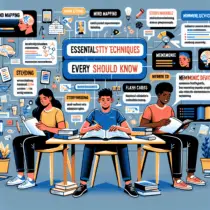Essential Study Techniques Every Student Should Know
Every student faces the challenge of figuring out the most effective ways to study. How can one absorb and retain massive amounts of information, especially when the pressure to succeed is high? The answer lies in adopting practical and consistent study techniques that are proven to enhance learning and retention. This article will walk you through essential study techniques every student should know, ensuring you’re equipped to break barriers and unlock opportunities in your academic journey.
Active Reading and Note-Taking
One of the most fundamental study techniques is active reading coupled with efficient note-taking. Active reading means engaging with the material beyond just skimming through it. It involves highlighting key concepts, summarizing information in your own words, and asking questions about the content. By doing so, students can better understand and remember what they’ve read.
Note-taking should not just be a transcription of everything the instructor says or everything in the textbook. Instead, focus on key points and concepts. Use bullet points, headings, and subheadings to organize information. You can also employ methods like the Cornell Note-taking System, which involves dividing your paper into sections for notes, key points, and summaries.
Time Management and Organization
Effective time management is crucial for academic success. Students should create a study schedule that allocates specific blocks of time for different subjects or tasks. Using planners or digital apps can help in keeping track of assignments, deadlines, and exams. A well-organized study plan prevents last-minute cramming and reduces stress.
Organizing study materials is equally important. Keep your notes, textbooks, and digital files in order so that you can easily find and review them later. Cluttered study spaces can lead to distractions and wasted time.
Active Recall and Spaced Repetition
Active recall and spaced repetition are scientifically proven methods for improving memory retention. Active recall involves retrieving information from memory without looking at the source material. This can be done through self-testing or using flashcards. The act of recalling information strengthens neural pathways, making it easier to remember in the future.
Spaced repetition involves reviewing information at increasing intervals over time. Instead of cramming, students review material multiple times over a few days or weeks. This technique takes advantage of the psychological spacing effect, which states that information is better retained when learning is spread out over time.
Study Groups and Peer Discussions
Study groups can be incredibly beneficial for understanding complex subjects. Discussing material with peers allows students to gain different perspectives and explanations, which can enhance comprehension. When students teach or explain concepts to each other, they reinforce their own understanding of the material.
However, it’s essential to stay focused during group study sessions. Clearly defined goals and structured discussions can help prevent sessions from becoming social gatherings with little academic value.
Breaking Barriers: Scholarships for First-Generation Students
First-generation students—those who are the first in their families to attend college—often face unique challenges in their academic journeys. Financial constraints can be a significant barrier. Fortunately, there are scholarships specifically designed to support these students. For instance, the First Generation Matching Grant Program provides financial aid to first-generation college students based on financial need.
By applying for such scholarships, first-generation students can alleviate some of the financial burdens of college, allowing them to focus more on their studies and less on financial worries.
Unlocking Opportunities: Your Guide to Fully Funded Scholarships
Fully funded scholarships can significantly impact a student’s academic and personal life. Scholarships that cover tuition, books, and even living expenses can make higher education accessible for students from diverse backgrounds. One notable example is the Gates Millennium Scholars Program, which offers full financial support for undergraduate studies to outstanding minority students.
Securing a fully funded scholarship involves thorough research and preparation. Students should be proactive in searching for scholarships early, ensuring they meet eligibility requirements and deadlines. Writing compelling personal statements and securing strong letters of recommendation are also critical components of a successful scholarship application.
Utilizing School Resources
Most schools offer a range of resources to help students succeed. These can include academic advising, tutoring centers, and writing labs. Academic advisors can help students plan their coursework and provide guidance on academic goals. Tutors offer additional support in challenging subjects, helping students grasp difficult concepts.
Writing labs are particularly useful for improving writing skills, from grammar and composition to research and citation. Taking advantage of these resources can provide significant academic support and enhance a student’s overall performance.
Healthy Lifestyle and Stress Management
Maintaining a healthy lifestyle is often overlooked but is essential for effective studying. Adequate sleep, regular exercise, and a balanced diet can greatly impact cognitive function and energy levels. A well-rested and nourished brain is better equipped to absorb and retain information.
Stress management strategies are also crucial. Practices such as mindfulness, meditation, and deep-breathing exercises can help students manage stress and stay focused. It’s important to take regular breaks during study sessions to avoid burnout. Techniques like the Pomodoro Technique, which involves studying for 25 minutes followed by a 5-minute break, can increase productivity and mental clarity.
Setting SMART Goals
Setting specific, measurable, achievable, relevant, and time-bound (SMART) goals can help students stay motivated and focused. For example, instead of saying "I will study more," a SMART goal would be "I will study biology for one hour every day from Monday to Friday for the next two weeks."
SMART goals provide a clear roadmap and make it easier to track progress. Achieving these smaller, manageable goals can build confidence and pave the way toward larger academic achievements.
Technology in Studying
In the digital age, technology can be a powerful tool for studying. Educational apps, online courses, and digital flashcards can complement traditional study methods. Apps like Quizlet allow students to create and share flashcards, making it easier to practice active recall. Online platforms like Coursera and Khan Academy offer courses and tutorials on a wide range of subjects.
However, it’s important to use technology wisely. Avoid distractions from social media and limit the time spent on non-educational activities. Using tech to enhance, rather than hinder, the study experience can lead to greater academic success.
Self-Assessment and Continuous Improvement
Regular self-assessment helps students identify their strengths and areas for improvement. After each exam or assignment, take the time to review feedback and understand where mistakes were made. Reflect on study habits and strategies to identify what works and what needs adjustment.
Continuous improvement involves being open to change and willing to try new study techniques. The most successful students adapt and refine their methods over time, ensuring they remain effective and efficient in their learning process.
Conclusion
Adopting essential study techniques can significantly improve a student’s academic performance and overall learning experience. From active reading and time management to utilizing school resources and setting SMART goals, these strategies provide a comprehensive approach to studying effectively. Moreover, understanding and applying for scholarships, such as those for first-generation students or fully funded opportunities, can remove financial barriers and unlock new possibilities.
Every student has the potential to succeed with the right tools and techniques. By implementing these study strategies and making use of available resources, students can enhance their learning experience, achieve their academic goals, and pave the way for a successful future.






